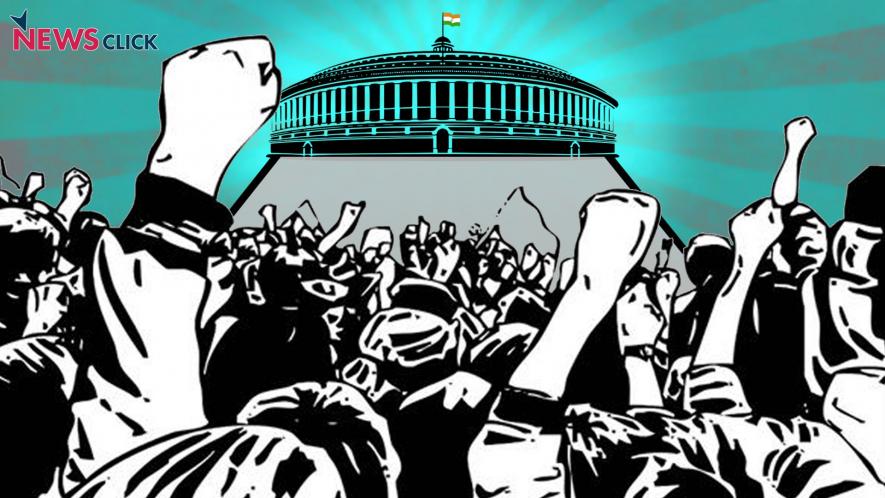Labour Codes: Central Trade Unions Call for Nationwide Protest on August 2

Expressing strong objections against the codification of labour laws, the central trade unions have called upon the workers, unions and federations, irrespective of their affiliations to come together for a nationwide protest on August 2.
Except the Rashtriya Swayamsevak Sangh-affiliated Bharatiya Mazdoor Sangh (BMS), the protest call has been supported by all central trade unions – Centre of Indian Trade Unions (CITU), All India Trade Union Congress (AITUC), All India Central Council of Trade Unions (AICCTU), Indian National Trade Union Congress (INTUC), All India United Trade Union Centre (AIUTUC), Hind Mazdoor Sabha (HMS), Trade Union Coordination Centre (TUCC), Self Employed Women’s Association (SEWA), Labour Progressive Front (LPF) and United Trade Union Congress (UTUC).
The Modi government, on Tuesday, July 23, tabled the Code on Wage Bill, 2019, and Code on Occupational, Safety, Health and Working Conditions Bill, 2019, (OSH Code) in the Lok Sabha. Both the bills seek to subsume 17 central laws in total, with the wage code seeking to replace the existing laws relating to workers’ remuneration and the OSH code curtailing the rights of workers in securing better working conditions.
Also read: New Starvation-Level Wage Announced by Labour Minister
From the time when the Modi government 1.0 introduced the Code on Wage Bill, 2017, in the Lok Sabha for the first time in August 2017, the Bill, along with the idea to amalgamate 44 central labour laws into four labour codes has drawn strong opposition from the trade unions. The trade unions accuse the Modi government of actually weakening the legislations surrounding the labour compliances.
Earlier this year, a historic two-day general strike was observed on January 8 and 9 to press for a 12-point demand charter, one of which was the demand to end the dilution of labour laws.
NewsClick has reported on the various bones of contentions between the ruling government and the central trade unions regarding the labour reforms, which according to the union leaders is a move to “mislead workers and tame trade unions.”
Speaking to NewsClick, Amarjeet Kaur, general secretary of AITUC, has expressed the need for a strong protest against the amalgamation of labour laws into codes. She commented that these labour codes, if implemented, will only benefit the employer. This will make it harder for a worker to sustain in an economic environment which is already very exclusionary in terms of who gets to benefit from the decisions of the ruling government.
The major objection of the trade unions is that the Code doesn’t acknowledge the well settled principles of calculating minimum wages – based on per capita food intake of at least 2,700 calories for a worker’s family comprising three units (2 adults and 2 children) – unanimously adopted by the 15th Indian Labour Conference (ILC) and further expanded by the Supreme Court in 1992 in the Raptakos and Brett case. These principles were again unanimously recommended by the 46th ILC in 2015 of which the Modi government 1.0 was a party too.
Also read: 'Proposed Labour Codes Will Further Destroy Workers’ Rights’
According to the principles, which were also accepted by the 7th Pay Commission for wage fixation of all central government employees, the absolute minimum wage needs to be at least ₹ 18,000 per month, translating to be ₹ 692 per day.
In January 2018, a committee, headed by Anoop Satpathy, was set up to recommend a National Minimum Wage. However, the methodology adopted by the committee actually tampered with the ILC recommendations, for example, revising the 2,700 calorie intake to 2,400 arbitrarily.
What’s more, on July 10, the government announced the new floor level minimum wage to be ₹ 178 per day which is mere ₹ 2 more than what was declared last two years. CITU, in a press statement, has condemned this “shameless” declaration of the new floor level minimum wage, which goes against the government’s own Expert Committee recommendation of ₹ 375 per day.
Speaking of the OSH Code, while the Modi government is boasting about enhancing the coverage of the code to the workers in the unorganised sector, Kaur has criticised the Modi government for envisaging uniform welfare provisions for different establishments in separate sectors that entail different health hazards for a worker.
NewsClick also spoke to Virjesh Upadhyay, general secretary of BMS, who said that the union is currently studying the provisions of both the bills. He also said that the BMS will not take part in the August 2 protest.
Also read: Govt. Report Reveals Shocking Condition of Workers in India
Get the latest reports & analysis with people's perspective on Protests, movements & deep analytical videos, discussions of the current affairs in your Telegram app. Subscribe to NewsClick's Telegram channel & get Real-Time updates on stories, as they get published on our website.























